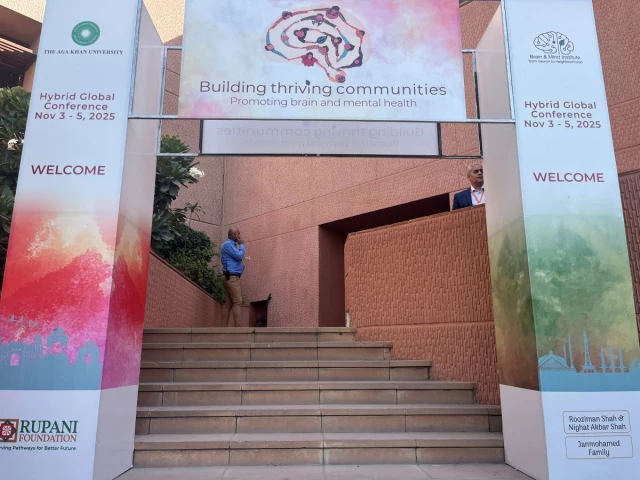Brain and Mind: Experts push for multi-layered mental health solutions, not just tertiary care
Can't dismiss income inequality, climate change when dispensing mental healthcare, say doctors at AKUH conference

Mental health is a multifaceted issue that needs to be addressed at every echelon of society and across all walks of professional and communal life, underscored experts at Aga Khan University Hospital's (AKUH) Brain and Mind conference on Wednesday.
The two-day conference featured discussions on a variety of subjects, from the effects of climate change on mental health and suicidality to the ways mental health practices can be integrated into policy and primary health care. Around 74 moderators, panellists and local and international speakers from Kenya, America, the United Kingdom and more shared their insights.
Panellists covered topics regarding the brain-gut connection, non-communicable diseases, the mental health journeys of young migrants, digital mental health, suicide prevention, climate change and mental health, brain ageing and dementia, and the importance of contextualising mental health outcomes.
On Wednesday, Founding Director of the Brain and Mind Institute (BMI) Dr Zul Merali invited participants and audience members to "bring not just our expertise, but our humanity," emphasising the need to treat mental health as a multifaceted problem.
Former state minister of health Dr Zafar Mirza spoke about the realities of implementing a mental health plan, explaining that it is impossible to separate economic hardships from psychological suffering. "The issue of our country is wealth inequality, and 78 years of such inequality...Inequity in healthcare haunts us," he said, referring to the vast number of Pakistanis living on the poverty line. Most of the money in healthcare goes to tertiary care, not primary care, which benefits the poor the most, he noted.
Read: Pakistan’s poverty rate rises to 44.7% under new World Bank thresholds
He emphasised the need for implementing robust healthcare models. "We already have essential packages of services, but nobody has implemented them." He argued that before we can talk about mental health in our healthcare systems, we must first provide basic healthcare needs for all and integrate mental health into those essential services.
Earlier, National Adviser on Mental Health Dr Asma Humayun opened the conference today underscoring the challenges and opportunities when prioritising mental healthcare in Pakistan. She spoke on the current status of the Mental Health and Psychosocial Support (MHPSS) model she had been working on, detailing the journey of its formation and implementation in different phases from 2021 to 2025. "Pakistan is one of the few countries able to incorporate mental health into the agenda."
She said that a robust MHPSS model needs to be multi-layered and implemented as such, as single-tier implementations of mental healthcare solutions (only addressing one facet of policy or society) do not work. "This is a comprehensive model; we think that this will help us build the system that is missing both at the level of communities and primary care."
CEO of Tech4Life Enterprises Dr Shariq Khoja spoke about empowering primary mental health workers with digital tools, explaining that most people in Pakistan possess smartphones, which would allow them to utilise digital apps and AI-powered tools to assist in providing mental health services quickly.
Professor of Child Psychiatry at the University of Liverpool Dr Atif Rahman explained that this would also streamline the process of teaching and co-producing mental health interventions with community health workers for the specific contexts they work in.
Meanwhile, UK Lead of Climate Cares Centre and Mental Health Dr Emma Lawrance opened the session on climate change and its effects on mental health, detailing the cycle of climate disasters leading to worsening mental health outcomes. She said that there is a need for a multidisciplinary approach that brings together climate and mental health workers (especially those in natural-disaster-affected areas) to provide improved care, which she said can assist in reducing suicidality.
Read more: 'One in three Pakistanis suffer from psychological disorders'
Professor at the Department of Epidemiology and Prevention at Wake Forest University, Dr Michelle Mielke, and Professor of Medicine, University of Wisconsin-Madison, Dr Ozioma Okonkwo, spoke about Alzheimer's Disease. Dr Michelle explained the current state of using biological markers in the blood to identify Alzheimer's, pointing out that it must be treated with caution, as other factors, such as Chronic Kidney Disease, can lead to misdiagnoses.
Dr Ozioma showed his team's work, in which he called attention to methods that one could take to stave off the risk of Alzheimer's. He said the "best thing" that one could possibly do is be physically active (specifically with cardiovascular exercises), and that there was no limit to when you could start.
A presentation on suicide prevention by Senior Scientist at BMI, Dr Murad Moosa Khan, outlined a research strategy for suicide prevention in Pakistan. He went over the problem areas and current limitations, stating that the main problem with suicide statistics is the lack of a suicide surveillance system, as he said, we have no actual suicide statistics in the country, only projections from the WHO. "I believe these numbers [from the WHO] are underestimates," he added.
Last but not least, there were film screenings on both days, featuring "Darya ke iss paar," a film by Nighat Akbar Shah, and episodes from "Voices from the Roof of the World," a documentary series about the impact of climate change and the crises affecting different areas.



















COMMENTS
Comments are moderated and generally will be posted if they are on-topic and not abusive.
For more information, please see our Comments FAQ